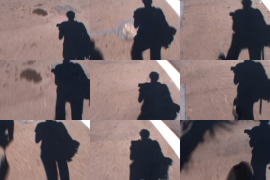
Ryan Bishop: Re: Fluid Borders, Structured Chaos, Weak Discipline
What would be an originary event of peace?
Wolfgang provocatively asks this question after reminding us that violence is an event and peace is a state, the former more visible, tangible, material and evident than the latter. Can a state become an event, or is this merely the impossibility of trying to find what is perhaps impossible to find? James der Derian usefully tells us that the majority of the “volunteer army” (a misnomer if ever a nome missed) did not simply sign on for financial and educational opportunities not offered to them through any other venue in US society – that, they also were looking for meanings, solutions, direction, purpose in a world and place bereft of it. When the trajectories of western history repeat an oscillation between the “two violent conceptions of history” reconciled under the silence wrought by the unassailable thought of “security,” as Wolfgang, argues, to where can the youth of a nation turn for meaning? The centrality of the violence, and the institutions that seek to contain it and turn it to their ends as well as those organizations and individuals that seek to undo it, results largely from the inescapable situation that the problem of violence is inextricably intertwined with the problem of knowledge itself.
The issue, then, becomes one of epistemology and violence, as well as epistemological violence – all of which seems deeply counterintuitive to us, children of the Enlightenment that we are. But it is more evident in the current moment than perhaps at any other point in time that the part that knowledge plays in creating meaning in the world is bound by and made possible through force: the force of an argument, the subjugation of counter positions, the dismissal or erasure of traditions, the mobilization of wealth and material to legitimize and circulate knowledge in a form, medium or institution (including our beloved internet). Military technology (including our beloved internet) is the most obvious manifestation of epistemological power as it materializes specific technicities that pertain to centuries of scientific, rational and instrumental thought. Our current model for the global university is the research and development institution that emerged under the guidance of coordinated government, corporate and military demands in the US immediately following WWII when the country decided not to demobilize for peace time, as after the first World War, but to step exponentially those processes and knowledges perceived as making a decisive difference in the outcome of the just ended conflict. Such would make us secure, we believed and were told to believe, and security became common knowledge. With these steps, we find ourselves caught in a simulation of security and even a simulation of war (pace Baudrillard) without either being a state or an event.
What would be an originary event of peace? Perhaps a thought, a thought well-considered and contemplated, but withheld.
> Ryan Bishop

